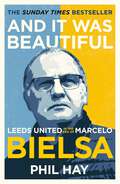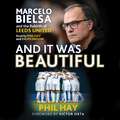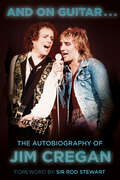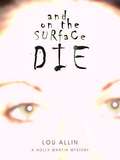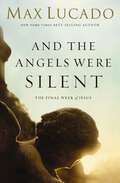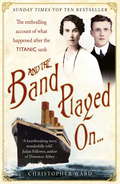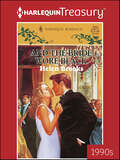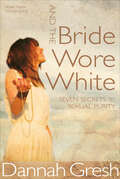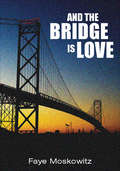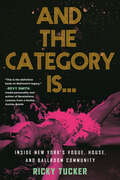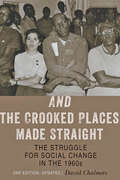- Table View
- List View
And it was Beautiful: Marcelo Bielsa and the Rebirth of Leeds United
by Phil HayThe behind-the-scenes story of the Marcelo Bielsa revolution at Leeds United and their first season back in the Premier League after sixteen years of hurt.FEATURING FRESH PERSONAL INSIGHT FROM MARCELO BIELSAWhen Marcelo Bielsa was appointed head coach of Leeds United in the summer of 2018, the club had just finished 13th in the Championship - their 15th consecutive season outside the top flight - and were defined as much by their excesses and disasters off the pitch as their lack of success on it. Bielsa changed everything.In guiding Leeds back to the promised land of the Premier League, he has transformed the club into a vastly more dynamic, entertaining and professional outfit, fully endearing himself to the Leeds faithful and capturing the imaginations of football fans around the world. With his unique tactical approach, strict diet and body fat controls and a gruelling training schedule - including his infamous 'murderball' sessions - Bielsa has shaped a gang of Championship misfits and journeymen into a team that plays breathtakingly relentless attacking football and is more than capable of going toe-to-toe with the game's established heavyweights.In And it was Beautiful, Phil Hay documents the fortunes of Leeds United under Marcelo Bielsa during their return to the Premier League for the 2020/21 season. By weaving in stories of crises from the club's purgatory in the English Football League, he presents a comprehensive and compelling portrait of an enigmatic manager whose values are the antithesis of everything that has previously gone wrong at Leeds during the dark days of Ken Bates, Massimo Cellino and GFH. Phil pulls back the curtain on Bielsa's innovative tactical methods, his unconventional yet highly productive relationship with owner Andrea Radrizzani and Director of Football Victor Orta, his intensely loyal backroom team and the extraordinary cultural impact Bielsa has had on the city of Leeds - from murals and songs to cult fanbases in the provinces of Argentina. The result is a unique and beautiful love affair that has made dreams come true.
And it was Beautiful: Marcelo Bielsa and the Rebirth of Leeds United
by Phil HayTHE INSTANT SUNDAY TIMES TOP TEN BESTSELLERThe behind-the-scenes story of the Marcelo Bielsa revolution at Leeds United and their first season back in the Premier League after sixteen years of hurt.FEATURING FRESH PERSONAL INSIGHT FROM MARCELO BIELSAWhen Marcelo Bielsa was appointed head coach of Leeds United in the summer of 2018, the club had just finished 13th in the Championship - their 15th consecutive season outside the top flight - and were defined as much by their excesses and disasters off the pitch as their lack of success on it. Bielsa changed everything.In guiding Leeds back to the promised land of the Premier League, he has transformed the club into a vastly more dynamic, entertaining and professional outfit, fully endearing himself to the Leeds faithful and capturing the imaginations of football fans around the world. With his unique tactical approach, strict diet and body fat controls and a gruelling training schedule - including his infamous 'murderball' sessions - Bielsa has shaped a gang of Championship misfits and journeymen into a team that plays breathtakingly relentless attacking football and is more than capable of going toe-to-toe with the game's established heavyweights.In And it was Beautiful, Phil Hay documents the fortunes of Leeds United under Marcelo Bielsa during their return to the Premier League for the 2020/21 season. By weaving in stories of crises from the club's purgatory in the English Football League, he presents a comprehensive and compelling portrait of an enigmatic manager whose values are the antithesis of everything that has previously gone wrong at Leeds during the dark days of Ken Bates, Massimo Cellino and GFH. Phil pulls back the curtain on Bielsa's innovative tactical methods, his unconventional yet highly productive relationship with owner Andrea Radrizzani and Director of Football Victor Orta, his intensely loyal backroom team and the extraordinary cultural impact Bielsa has had on the city of Leeds - from murals and songs to cult fanbases in the provinces of Argentina. The result is a unique and beautiful love affair that has made dreams come true.
And on Guitar...: The Autobiography of Jim Cregan
by Rod Stewart Andy Merriman Jim CreganJim Cregan’s career as a rock guitarist, songwriter and producer has spanned over fifty years, touring and recording albums with stars such as Elton John, Cat Stevens, Family, Willie Nelson, Steve Harley and Cockney Rebel, Joe Cocker, The Gypsy Kings, and Katie Melua. However, he is perhaps best known for his forty-year association with Rod Stewart, not only as his guitarist but also being best friends and godfathers to each other’s children.In his autobiography Jim Cregan lifts the lid on his extraordinary life, recounting his experiences with music’s biggest stars, from his first band at the age of 14 playing in youth clubs in Poole to performing in front of 350,000 people in Rio de Janeiro. In And on Guitar . . . Cregan holds nothing back: from his early life and anecdotes about his family to shenanigans on the road and extraordinary tales of hedonism, love and loss, his stories feature a Who’s Who of music’s biggest stars.
And on the Eighth Day
by Ellery QueenDeath Valley lives up to its name when a murder draws Ellery Queen into the strange practices of a religious cult. It&’s 1943, the war is raging, and sleuthing scribe Ellery Queen wants to do his bit. After a tortuous cross-country drive, he takes a job writing scripts for a Hollywood propaganda house—twelve hours a day of hack work that quickly turns his mind to jelly. After a few weeks, he is so worn down that he can type nothing but gibberish, and he decides to drive home. The trouble starts as soon as he reaches the desert. His ancient roadster breaks down on the edge of Death Valley. Wandering in search of help, he is saved by a man known as the Teacher, who takes him to an oasis called Quenan. Here, Queen finds a bizarre, reclusive cult that seems to have come straight out of the ancient past. A murder has been committed in the desert, and the Quenanites plan on delivering some Old Testament justice. Queen is just the detective they&’ve been waiting for.
And on the Eighth Day (Ellery Queen Ser.)
by Ellery QueenDeath Valley lives up to its name when a murder draws Ellery Queen into the strange practices of a religious cult. It&’s 1943, the war is raging, and sleuthing scribe Ellery Queen wants to do his bit. After a tortuous cross-country drive, he takes a job writing scripts for a Hollywood propaganda house—twelve hours a day of hack work that quickly turns his mind to jelly. After a few weeks, he is so worn down that he can type nothing but gibberish, and he decides to drive home. The trouble starts as soon as he reaches the desert. His ancient roadster breaks down on the edge of Death Valley. Wandering in search of help, he is saved by a man known as the Teacher, who takes him to an oasis called Quenan. Here, Queen finds a bizarre, reclusive cult that seems to have come straight out of the ancient past. A murder has been committed in the desert, and the Quenanites plan on delivering some Old Testament justice. Queen is just the detective they&’ve been waiting for.
And on the Surface Die: A Holly Martin Mystery
by Lou AllinIn this new series by the acclaimed author of the Belle Palmer mysteries, RCMP Corporal Holly Martin takes charge of her first post, a detachment in tiny Fossil Bay on the wild south coast of Vancouver Island. Drunk drivers, speeders and the occasional theft from tourist cars lead the crime roster, but her first day starts with a distress call. A scuba diver has found the body of a girl in the surf. A tragic drowning caused by a fall? The late arrival of tox-scan results for crystal meth, the most recent plague to hit the island, raises ugly questions. Just before Holly makes an arrest, a record-setting typhoon roars in, empowered to destroy everything in its path. As the wind howls and trees crash around her, Holly struggles to survive and to bring a murderer to justice.
And the Angels Sing
by Fern MichaelsFern Michaels&’ Christmas novels are pure holiday magic—uplifting stories of love, family, and friendship in irresistible settings. And when she brings her bestselling Sisterhood series into the mix, the results are sure to kindle endless seasons of joy. The Sisterhood: a group of women from all walks of life bound by friendship and years of adventure. Armed with vast resources, top-notch expertise, and a loyal network of allies around the globe, the Sisterhood will not rest until every wrong is made right. Throughout the years, the ladies of the Sisterhood have delivered their own style of vigilante justice to those who most deserve it. But this Christmas, instead of finding and punishing bad guys, all Maggie Spritzer wants is to bring a little more joy to the world—and especially to a beloved teacher from her past. And as the Sisters unite to find Miss Roland, who seems to have mysteriously dropped off the face of the earth, they learn that no holiday treat is as fulfilling as giving to others . . . Previously published in Wishes for Christmas.
And the Angels Sing
by Kate WilhelmThe dozen stories in this delightful volume span the career of Kate Wilhelm, showcasing the wide-ranging works of this exceptional stylist. These stories include:"The Look Alike", in which a grieving young mother encounters a doppelganger of her lost daughter."Forever Yours, Anna", recipient of the 1988 Nebula Award for best short story."The Day of the Sharks", presents a relentless account of a woman recovering from a breakdown.Ranging from the harrowing to the humorous, from the charming to the strange, And the Angels Sing is a chorus of literary delights.
And the Angels Were Silent: The Final Week of Jesus
by Max LucadoAs Jesus entered His final days and faced Golgotha, He acted with loving purpose and deliberate intent. Each step was calculated. Every act premeditated. And the Angels Were Silent allows you to enter and observe a revealing and intimate view of our Savior's last week.
And the Band Played On: The enthralling account of what happened after the Titanic sank
by Christopher WardOn 14th April 1912 the Titanic struck an iceberg on her maiden voyage and sank. Fifteen hundred passengers and crew lost their lives. As the order to abandon ship was given, the orchestra took their instruments on deck and continued to play. They were still playing when the ship went down. The violinist, 21 year-old Jock Hume, knew that his fiancée, Mary, was expecting their first child, the author's mother. One hundred years later, Christopher Ward reveals a dramatic story of love, loss and betrayal, and the catastrophic impact of Jock's death on two very different Scottish families. He paints a vivid portrait of an age in which class determined the way you lived - and died. An outstanding piece of historical detective work, AND THE BAND PLAYED ON is also a moving account of how the author's quest to learn more about his grandfather revealed the shocking truth about a family he thought he knew, a truth that had been hidden for nearly a hundred years.
And the Band Played On: The enthralling account of what happened after the Titanic sank
by Christopher WardOn 14th April 1912 the Titanic struck an iceberg on her maiden voyage and sank. Fifteen hundred passengers and crew lost their lives. As the order to abandon ship was given, the orchestra took their instruments on deck and continued to play. They were still playing when the ship went down. The violinist, 21 year-old Jock Hume, knew that his fiancée, Mary, was expecting their first child, the author's mother. One hundred years later, Christopher Ward reveals a dramatic story of love, loss and betrayal, and the catastrophic impact of Jock's death on two very different Scottish families. He paints a vivid portrait of an age in which class determined the way you lived - and died. An outstanding piece of historical detective work, AND THE BAND PLAYED ON is also a moving account of how the author's quest to learn more about his grandfather revealed the shocking truth about a family he thought he knew, a truth that had been hidden for nearly a hundred years.
And the Birds Rained Down
by Jocelyne SaucierA CBC Canada Reads 2015 Selection Finalist for the 2013 Governor General's Literary Award for French-to-English Translation Deep in a Northern Ontario forest live Tom and Charlie, two octogenarians determined to live out the rest of their lives on their own terms: free of all ties and responsibilities, their only connection to civilization two pot farmers who bring them whatever they can't eke out for themselves. But their solitude is disrupted by the arrival of two women. The first is a photographer searching for survivors of a series of catastrophic fires nearly a century earlier; the second is an elderly escapee from a psychiatric institution. The little hideaway in the woods will never be the same. Originally published in French, And the Birds Rained Down, the recipient of several prestigious prizes, including the Prix de Cinq Continents de la Francophonie, is a haunting meditation on aging and self-determination.
And the Bride Closed the Door
by Ronit MatalonA young bride shuts herself up in a bedroom on her wedding day, refusing to get married. In this moving and humorous look at contemporary Israel--and the chaotic ups and downs of love everywhere--her family gathers outside the locked door, not knowing what to do. The only communication they receive from behind the door are scribbled notes, one a cryptic poem about a prodigal daughter returning home. The harder they try to reach the defiant woman, the more her despairing groom becomes convinced her refusal should be respected. But what, exactly, ought to be respected? Is this merely a case of cold feet? A feminist statement? A mourning ritual? RONIT MATALON (1959-2017) was the author of nine novels and a social activist. And the Bride Closed the Door was awarded Israel's prestigious Brenner Prize the day before her death at age 58. Originally published in 2016 in Hebrew, this English translation was published in 2019.
And the Bride Wore Black
by Helen BrooksWedding Vows Were Meant to Be Kept!There was an old story about the Cade men: they only love once...but when they do, it's for eternity!But where did that leave an ordinary working girl like Fabia? Alex Cade had made it clear that he needed her solely for business purposes. Yet, somehow, nothing could stop the pangs of jealousy that pierced Fabia's heart whenever glamorous widow Susan latched on to Alex!Fabia was determined not to give in to her feelings. She had made a vow, and it was one she didn't take lightly...that if she was foolish enough to fall in love, then she would wear black on her wedding day!
And the Bride Wore Plaid (Talisman Ring #4)
by Karen HawkinsDevon St John has never had a problem in his life-until now. Born to wealth and privilege, surrounded by a warm and loving family, he has pursued a life of leisure, chasing the most beautiful women London has to offer. All told, he has the perfect life and no intentions of ever settling down in any shape, form or fashion. So resolved, he heads to his friend's Scottish castle, unaware that fate is already hard at work. As the illegitimate half-sister to Viscount Strathmore, Melody Macdonald refuses to reside under his roof and instead lives in a thatched house on the edge of the forest that borders Strathmore Castle. Ever since she ran off at the tender age of twelve to become an apprentice to a master of stained glass, Melody has been deplorably independent and wild. When Devon arrives at Strathmore Castle, he is taken aback by the rude, overbearing, illegitimate Scotswoman who refuses even to pretend to possess any feminine wiles. But Devon is determined to teach the strong-willed Melody a lesson in love ...
And the Bride Wore Red
by Lucy GordonOlivia Daley's travel itinerary might be unusual, but she believes the best cure for a broken heart is a radical change of scenery. Exotic, vibrant China is far enough from rainy gray England to be just that!In the hustle and bustle of Beijing, Olivia is starting a whole new adventure.... She's mesmerized by the ancient legends of love, and soon finds herself wishing she could be the bride who wore red.
And the Bride Wore White Companion Guide: Seven Secrets to Sexual Purity
by Dannah GreshCompanion guide to And the Bride Wore WhiteDon't let your youth be a cultural statistic. Youth leaders and parents will be glad to see the training materials available for the bestselling And the Bride Wore White by Dannah Gresh. Perfect for individual and small group study, the DVD, leader's guide, and study guide will complement perfectly. DVD includes bonus tracks.
And the Bride Wore White Companion Guide: Seven Secrets to Sexual Purity
by Dannah GreshCompanion guide to And the Bride Wore WhiteDon't let your youth be a cultural statistic. Youth leaders and parents will be glad to see the training materials available for the bestselling And the Bride Wore White by Dannah Gresh. Perfect for individual and small group study, the DVD, leader's guide, and study guide will complement perfectly. DVD includes bonus tracks.
And the Bride Wore White: Seven Secrets to Sexual Purity
by Dannah GreshWith over 250,000 copies sold, reviewers continue to rave about And the Bride Wore White: Seven Secrets To Purity. But the greatest proof of its effect is in the lives of tens of thousands of young women who've embraced the book's message. Each chapter of And the Bride Wore White begins with a narrative of Dannah Gresh's young love life, taken from her own teenage journals. She transparently shares her struggles and successes, her moments of pain followed by healing, and the moments of triumph. This story-line grips the young reader while they learn statistically proven risk-reduction factors. The end result are usable "how-to-say-no" skills that can reduce the risk of a young woman's heart being broken by sexual sin.In this update, Dannah and her friends share open letters of encouragement to young women, one to those who chose life and another to those who chose abortion, one to teen girls addicted to pornography and another to girls who have experienced sexual abuse, and many more specific to a young woman's unique circumstances.
And the Bride Wore White: Seven Secrets to Sexual Purity
by Dannah GreshWith over 250,000 copies sold, reviewers continue to rave about And the Bride Wore White: Seven Secrets To Purity. But the greatest proof of its effect is in the lives of tens of thousands of young women who've embraced the book's message. Each chapter of And the Bride Wore White begins with a narrative of Dannah Gresh's young love life, taken from her own teenage journals. She transparently shares her struggles and successes, her moments of pain followed by healing, and the moments of triumph. This story-line grips the young reader while they learn statistically proven risk-reduction factors. The end result are usable "how-to-say-no" skills that can reduce the risk of a young woman's heart being broken by sexual sin.In this update, Dannah and her friends share open letters of encouragement to young women, one to those who chose life and another to those who chose abortion, one to teen girls addicted to pornography and another to girls who have experienced sexual abuse, and many more specific to a young woman's unique circumstances.
And the Bridge Is Love: Life Stories (Jewish Women Writers Ser.)
by Faye Moskowitz"A book that will make you stand up and cheer."--The Detroit News "Bridges the gap between humor and despair, past and present, Jew and gentile, to reveal its author's simple humanity, deeply rooted in her unwavering love of family. . . . Touching and compelling."--The Washington Post "A modern woman's ancient voice, full of the juicy taste of life--knowing, loving, feeling, and clever."--Lore Segal The Feminist Press brings back into print a literary gem. Faye Moskowitz is author of A Leak in the Heart: Personal Essays and Life Stories and Whoever Finds This: I Love You, a collection of stories. She teaches writing at George Washington University.
And the Category Is…: Inside New York’s Vogue, House, and Ballroom Community
by Ricky TuckerAn Electric Literature &“Most Anticipated LGBTQ+ Book of 2022&” Selection A love letter to the legendary Black and Latinx LGBTQ underground subculture, uncovering its abundant legacy and influence in popular culture.What is Ballroom? Not a song, a documentary, a catchphrase, a TV show, or an individual pop star. It is an underground subculture founded over a century ago by LGBTQ African American and Latino men and women of Harlem. Arts-based and intersectional, it transcends identity, acting as a fearless response to the systemic marginalization of minority populations. Ricky Tucker pulls from his years as a close friend of the community to reveal the complex cultural makeup and ongoing relevance of house and Ballroom, a space where trans lives are respected and applauded, and queer youth are able to find family and acceptance. With each chapter framed as a &“category&” (Vogue, Realness, Body, et al.), And the Category Is . . . offers an impressionistic point of entry into this subculture, its deeply integrated history, and how it&’s been appropriated for mainstream audiences. Each category features an exclusive interview with fierce LGBTQ/POC Ballroom members—Lee Soulja, Benjamin Ninja, Twiggy Pucci Garçon, and more—whose life, work, and activism drive home that very category. At the height of public intrigue and awareness about Ballroom, thanks to TV shows like FX&’s Pose, Tucker&’s compelling narratives help us understand its relevance in pop culture, dance, public policy with regard to queer communities, and so much more. Welcome to the norm-defying realness of Ballroom.
And the Crooked Places Made Straight: The Struggle for Social Change in the 1960s (The American Moment)
by David ChalmersUpdated and revised, this is the best short interpretive history of the U.S. in the 1960s.David Chalmers's widely acclaimed overview of the 1960s describes how the civil rights movement touched off a growing challenge to traditional values and arrangements. Chalmers recounts the judicial revolution that set national standards for race, politics, policing, and privacy. He examines the long, losing war on poverty and the struggle between the media and the government over the war in Vietnam. He follows feminism's "second wave" and the emergence of the environmental, consumer, and citizen action movements. He also explores the worlds of rock, sex, and drugs, and the entwining of the youth culture, the counterculture, and the American marketplace.This newly revised edition covers the conservative counter-revolution and cultural wars. It carries the legacy of the 1960s forward: from Tom Hayden’s idealistic 1962 Port Huron Statement through Newt Gingrich’s 1994 "Contract with America" and Grover Norquist’s twenty-first century "Tax Payer’s Protection Pledge."
And the Crooked Places Made Straight: The Struggle for Social Change in the 1960s (The American Moment)
by David Chalmers“Marvelously comprehensive and superbly written. An exceptionally valuable overview of the 1960s, replete with astute interpretations and commentary.” —David J. Garrow, author of the Pulitzer Prize–winning Bearing the Cross: Martin Luther King, Jr., and the Southern Christian Leadership ConferenceDavid Chalmers’s widely acclaimed overview of the 1960s describes how the civil rights movement touched off a growing challenge to traditional values and arrangements. Chalmers recounts the judicial revolution that set national standards for race, politics, policing, and privacy. He examines the long, losing war on poverty and the struggle between the media and the government over the war in Vietnam. He follows feminism’s “second wave” and the emergence of the environmental, consumer, and citizen action movements. He also explores the worlds of rock, sex, and drugs, and the entwining of the youth culture, the counterculture, and the American marketplace.This newly revised edition covers the conservative counter-revolution and cultural wars. It carries the legacy of the 1960s forward: from Tom Hayden’s idealistic 1962 Port Huron Statement through Newt Gingrich’s 1994 “Contract with America” and Grover Norquist’s twenty-first century “Tax Payer’s Protection Pledge.”“With its hint of passion and irony, the title of David Chalmers’s book aptly captures the complexities of his study. Beautifully written, it is more than a recitation of the actors and events of the 1960s. It helps us to make sense of the decade.” —Dan T. Carter, author of Scottsboro: A Tragedy of the American South
